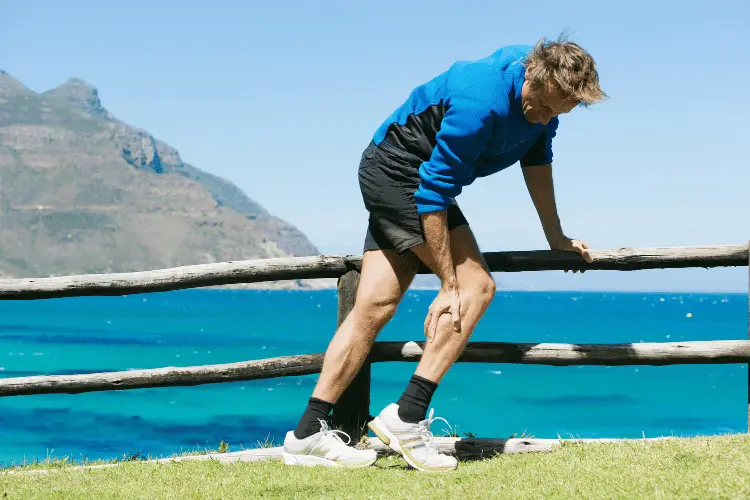If you’re into running and other physical activities, you may have experienced touching your hands or face during a sweaty workout and felt a sandy sensation on your skin.
Those white, coarse particles are salt crystals. They’re naturally secreted by our bodies through sweat and are primarily composed of salty minerals called electrolytes.
Our bodies maintain our temperature by sweating when we do physically taxing activities, such as running. However, we also lose vital nutrients and water in the process.
So, let’s cover the relationship between long-distance running and electrolytes, including the importance of these minerals in our bodily functions and the most effective ways of replenishing them.
Sweat Facts: What Are Electrolytes?
Electrolytes are essential minerals our body needs to operate properly. These minerals include sodium, potassium, calcium, magnesium, phosphorus, and chloride.
Purposes of Electrolytes in Your Body
Everybody needs electrolytes, as some of our vital bodily operations need them. Think of these minerals as your body’s battery which sustains organ functions and muscle movements.
Sodium and Potassium
Sodium, for instance, is crucial for regulating cell fluids inside your muscles and tissues. It’s also responsible for smooth muscle contractions and motions.
Your body uses sodium as a means of communication as well. Nerve cells communicate through sodium channels, signaling the whole nervous system.
Potassium, like sodium, helps maintain fluid balance, but on the cellular level. Your blood’s potassium content also assists in regulating your blood pressure.
This mineral works together with sodium to improve your body’s electrical system. It helps your brain cells communicate, maintaining a healthy connection line between nerves.

Chloride and Magnesium
If sodium is responsible for fluid outside the cells and potassium for fluid inside the cells, chloride is for fluid entering and leaving the cells. It’s also in charge of keeping your blood’s pH level and aids your nerve and muscle cells.
Magnesium also plays a crucial role in your body’s energy production. A normal magnesium level promotes healthy bones, muscle processes, nerve activities, and blood sugar levels.
Phosphorus and Calcium
Phosphorus is another electrolyte that helps your body with its energy generation. It’s commonly found in the form of phosphate and is vital in healthy heart function.
Calcium, as you may have already known, is a vital player in your muscle and bone development. What most people don’t know about calcium, however, is its role in the nervous system, particularly in your brain’s ability to command muscles.
Electrolytes and Long-Distance Running
For a runner, keeping a healthy balance of electrolytes is vital to their overall performance. While running, they help distribute water in your tissues, organs, and muscles.
Endurance and Cognition
Aside from motor and muscle efficiency, electrolytes enhance the endurance of runner athletes. So, you’re less likely to tire easily halfway through your target mileage.
Experts believe you lose around 1% to 2% of your body mass when dehydrated. This reduction leads to decreased muscle strength, which is crucial for sustaining long miles of running.
Several studies also link hypohydration, or the severe loss of essential fluid and minerals without sufficient replenishment, to reduced cognition among athletes.
These minerals play crucial roles in your brain, nerves, and muscles’ communication. So, having enough electrolytes could lead to quicker mental function relating to muscle movement.
Cramps and Fatigue
A balanced electrolyte level means you’re less likely to experience cramps, which are quite painful and inconvenient, especially during competitive running sports.
A new study from Edith Cowan University supports this, revealing that people who drink pure water instead of water containing electrolytes are more prone to cramping.
Cases of fatigue are also lessened in runners with appropriate electrolyte replacement, with some sources reporting a 37% reduction in athlete fatigue levels.
This feat is thanks to these minerals’ ability to balance stress hormones and reduce adrenaline fatigue. As such, you won’t have to worry about the energy crash after your mileage.

Electrolyte and Endurance Activities
Regardless of the activity, you’ll lose electrolytes long as your body exerts energy and sweat. So, you’ll still need to replenish as many electrolytes for optimal performance.
Rehydrating body fluids and minerals is especially vital for athletes who play under extreme heat with continuous body movements. Because of the nature and environment of their activities, they sweat more and lose more minerals.
Electrolyte Loss When Sweating
The amount of fluid and electrolytes lost during physical activities depends on several factors. One such factor is the amount of heat generated by the athlete.
More heat typically means more energy released. And the more energy your body releases, the more it needs to regulate temperature by excreting sweat.
What is Sweat Made of?
The composition of sweat is typically 99% water and 1% electrolytes, with sodium and chloride being the most abundant components of the 1%.
Potassium, calcium, and magnesium are still present, albeit in smaller amounts. Nevertheless, experts still stress the importance of replenishing these electrolytes as much as the others.
Dehydration and Low Electrolyte Levels
The average athlete loses around one to three liters of sweat every hour of physical activity, depending on a number of factors. This also means they lose considerable amounts of electrolytes in the process.
Electrolyte Imbalance: Causes and Symptoms
Electrolyte levels can become too low or too high, leading to an imbalance. This abnormality can harm your body and can even be proven fatal to some.
For athletes, this condition is commonly caused by severe dehydration from extended physical activities. The weather, especially excessive heat, can also exacerbate this issue.
People with chronic illnesses, such as kidney failure, may experience the same disturbance in their electrolyte balance. Vomiting and diarrhea contribute to dehydration as well.
That said, symptoms from an electrolyte imbalance will depend on which specific mineral is too high or too low. However, it usually includes one or more of these signs:
- Weakness and fatigue after a workout.
- Irregular heartbeat (arrhythmia) even though you’re breathing normally.
- Sudden changes in blood pressure.
- Experiencing more muscle cramps or muscle weakness after physical activity.
- Decreased ability to concentrate on tasks.
Patients with mild electrolyte imbalance may never experience any of these symptoms. Regardless, if you suspect yourself to have this condition, talk to your doctor immediately.
Overhydration: Causes and Symptoms
One common misconception about sports dehydration is that you can avoid it by simply drinking a lot of water. Scientific research, however, tells otherwise.
Hydration doesn’t only mean replenishing your body’s lost fluid. It also means recovering the nutrients and minerals lost during physical exertion, especially electrolytes.
Electrolyte imbalance doesn’t only occur in overly dehydrated individuals. And you may experience the same problem with excess water coursing through your body.
That said, too much water during taxing physical workouts may even lead to a medical condition called hyponatremia (low sodium levels in the blood). Medications and illnesses may result in the same health issue as well.
Here are some of the symptoms of overhydration:
- Experiencing nausea and fatigue after physical activity.
- Decreased muscle strength that may come with twitching.
- Muscles that are prone to cramping.
- Considerable loss of energy.
- Confusion and inability to focus on several tasks.
- Headaches and, on some rare occasions, vomiting.
It’s worth noting that mild hyponatremia may not exhibit any of these signs. Experts mainly documented these symptoms of patients suffering from severe overhydration.
Do Experts Recommend Using Electrolyte Drinks?

There’s no shortage of neon-colored drinks promising to replenish your lost electrolytes. Most throw additional perks such as improved physical performance or fast recovery.
Given their popularity, there’s a high chance you’ve already tried some of these brands—you may even be a regular drinker. But have you ever wondered if these drinks work?
According to experts, the effectiveness of sports drinks may depend on the intensity of your workout. Regular water works perfectly enough if you plan on working out for less than an hour.
Electrolyte water works best for athletes and individuals who exert significant energy for extended periods, as they lose more water and minerals that need recovering.
Try looking for a brand with clear labels. Ideally, you’d want to choose those that include minerals lost through sweating, like sodium, potassium, and chloride.
Replacing Electrolytes: Food Sources
The American College of Sports Medicine highlights the importance of appropriate electrolyte replenishment, given the taxing nature of sports activities.
There are several foods available that provide significant amounts of these minerals. So, here’s a cheat list for your electrolyte replenishment diet:
Food to Replenish Sodium
- Salted crackers
- Canned beans with added salt
- Smoked, cured, or salted meat
- Juicy fruits, like apples and pineapples
- Salted nuts
- Canned entrees
- Breaded meats, such as pizza and burritos
Food to Replenish Potassium
- Dried fruits, like raisins and apricot
- Bananas
- Coconut
- Avocado
- Citrus fruits
- Leafy greens
- Spinach and broccoli
It’s necessary to recover the nutrients and minerals lost in sweat. However, you should still watch the amount of sodium and potassium you consume to avoid electrolyte imbalances.
Final Thoughts
Electrolytes are essential for optimal muscle and brain functions. Maintaining the appropriate amounts of these minerals is even more indispensable for athletes.
However, regardless of workout routines, everyone should do their best to keep their bodies healthy. So, don’t forget to replenish your electrolytes while racking your mileage!
References
- https://www.hackensackmeridianhealth.org/en/HealthU/2020/06/22/why-is-my-sweat-so-salty#.ZCEzGnbP02w
- https://www.nutritionnews.abbott/healthy-living/active-lifestyle/what-are-electrolytes-/
- https://biobeat.nigms.nih.gov/2020/11/pass-the-salt-sodiums-role-in-nerve-signaling-and-stress-on-blood-vessels/
- https://www.webmd.com/a-to-z-guides/story/potassium-and-your-body
- https://medlineplus.gov/ency/article/002350.htm
- https://www.ncbi.nlm.nih.gov/books/NBK541123/
- https://www.cdc.gov/salt/potassium.htm
- https://www.hsph.harvard.edu/nutritionsource/chloride/
- https://healthyeating.sfgate.com/phosphorus-heart-7781.html
- https://www.brainfacts.org/brain-anatomy-and-function/genes-and-molecules/2020/neurons-run-on-calcium-022020
- https://www.avera.org/balance/sports-medicine-and-performance-training/what-we-lose-in-sweat/
- https://www.nyrr.org/run/photos-and-stories/2019/should-i-take-salt-during-a-marathon
- https://www.kidney.org/atoz/content/hyponatremia
- https://www.acsm.org/search-results/all-blog-posts/certification-blog/acsm-certified-blog/2019/11/01/science-of-the-endurance-athlete-QnA
- https://inbodyusa.com/blogs/inbodyblog/how-dehydration-affects-your-body-composition/
- https://www.tandfonline.com/doi/full/10.1186/s12970-021-00414-8
- https://www.thehealthsite.com/fitness/best-electrolyte-drinks-to-beat-fatigue-629517/
- https://courses.lumenlearning.com/suny-ap2/chapter/energy-and-heat-balance/
- https://medlineplus.gov/ency/anatomyvideos/000127.htm
- https://www.ncbi.nlm.nih.gov/pmc/articles/PMC3043756/
- https://www.nhlbi.nih.gov/health/arrhythmias
- https://www.mayoclinic.org/diseases-conditions/hyponatremia/symptoms-causes/syc-20373711
- https://www.scripps.org/news_items/3988-when-to-pick-electrolyte-drinks-over-water
- https://www.healthifyme.com/blog/sodium-rich-foods/
- https://www.hsph.harvard.edu/nutritionsource/potassium/


